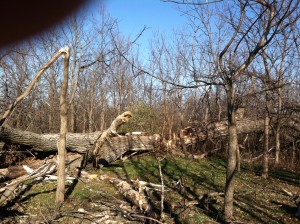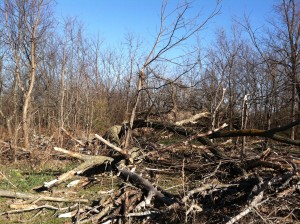“Travel is fatal to prejudice, bigotry, and
narrow-mindedness, and many of our people
need it sorely on these accounts. Broad, wholesome,
charitable views of men and things cannot
be acquired by vegetating in one little corner
of the earth all one’s lifetime.”
-Mark Twain
Innocents Abroad
“…nothing so liberalizes a man and expands
the kindly instincts that nature put in him as travel
and contact with many kinds of people.”
-Mark Twain
Letter to San Francisco Alta California, May 18, 1867
Anyone who knows me very well will attest that I love to travel. Even after finishing a four day trip flying around the U.S. I am keen, when I get home, to jump in the car with my wife and kids and take a road trip. I love geography and I love maps and I love to see and meet other people who look and think differently from me. I take Robert Frost’s suggestion seriously that “the best thing we’re put here for’s to see.” The point of travel, I think, is to see, to bear witness. The urge to travel and to “see” molds a man into something different than he was, perhaps even into the liberalized man of expanded kindly instincts that Mark Twain describes. I like to think Mark Twain was right about travel being “fatal to prejudice, bigotry, and narrow-mindedness.” I not only like to think it but I do, indeed, believe it. Travel makes a man better and, perhaps, if he can pass that instinct on to his son and daughter then he has changed them, too, for the better. And yet.
If travel is a mind-broadening and prejudice killing force, I think it also tests the “liberalized” man’s liberality. Because when one travels one comes into contact with strangers and strangers are, at least to him, strange. They challenge his assumptions and his expectations and maybe his sense of order and propriety. On the other hand, the man who lives in the same little town all his life may never encounter folks who challenge his narrow outlook. He will live in a comfortable cocoon of conformity (to conjure a Spiro Agnew-ism). He may retain his biases but, if he is geographically insulated enough, it may not matter. It is the traveller who needs to hold Twain’s words not as axioms but as aspirations. Travel is neither necessary for open-mindedness, nor is it sufficient to insure open-mindedness. It is a possible formula for achieving it.
My faith in Mark Twain’s formulation was tested on a recent trip. It was tested by North Dakota. Though I had been to 45 U.S. States and, indeed, every state and Canadian Province surrounding the Flickertail State I had never been to North Dakota. I must admit that I had already imbibed some of the negative stereotype that clings to this state. They have an “official state beverage” for example and it ain’t tequila. (It’s milk, by the way, probably warm white 2% if I don’t miss my guess.)
Or this:
Q: Did you hear the Governor’s Mansion in Bismarck burned down?
A: Yes, it almost took out the whole trailer park.
Or this:
Q: Why do ducks fly over North Dakota upside down?
A: There’s nothing worth crapping on.
Or this:
Q: How do you know if a man from North Dakota is married?
A: The tobacco spit stains are on both sides of the pickup. (The pickup theme will show up again later.)
To be fair I must concede that most of these barbs come from their beloved neighbors down below, the ever so urbane South Dakotans. If we wanted to we could apply a few of these zingers to them. To wit:
Q: Did you hear the Governor’s mansion in Pierre burned down…….?
Most North Dakota jokes can be just as easily reassigned to those bumpkins in Nebraska or Wisconsin or Missouri or even our neighbors to the west. Like this joke:
An Iowan and a North Dakotan were walking along a country road one day and spotted a sheep with it’s head caught in a fence. The North Dakotan immediately began pulling down his trousers. The Iowan, surprised, asked “What are you doing that for?” He replied, “well in North Dakota we don’t pass up an opportunity like this” and he has his way with the sheep. Finished, he turns to the Iowan and says, “Okay, your turn.” The Iowan shrugs, bends over, and sticks his head in the fence.
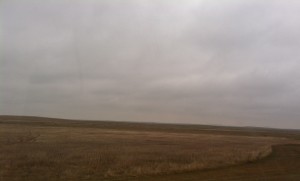
North Dakota – miles and miles of it
I arrived in Dickinson, North Dakota by airplane. As a pilot for a regional airline I see many small airports which lack the facilities of say, an O’Hare or a JFK. I am accustomed to landing on short runways and boarding and de-boarding without the luxury of a jetway. But after breaking out of a low grey overcast to find a narrow strip of black pavement surrounded by miles and miles of dull brown undulating grass I was surprised to pull up to an airline terminal no bigger than a house. I gingerly coaxed my 65 foot wingspan plane onto the 20 foot wide taxiway as my First Officer made radio calls “in the blind” to any other airplane that happened to be in the area. He made these announcements because not only does Dickinson lack radar coverage it also lacks a control tower to clear planes for takeoff and landing.
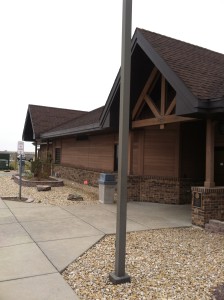
The Dickinson terminal – a whole lot less hassle than O’Hare
We let the people off the plane and in less than a minute I could see them in the parking lot on the other side of the fence getting into their cars. There is something to be said for small terminals, I guess. We called the hotel for a ride and in a few minutes were picked up at the curb by a young man in a Toyota Sienna, the first of many nonnative-North Dakotans we would meet.
With the discovery of an enormous pool of oil in what is called the Bakken formation Dickinson and its neighbor farther north, Williston, went from sleepy backward hamlets with an occasional bar fight to bustling backward hamlets with many bar fights. The boom in drilling and servicing oil wells brought jobless people from all over the country; places hit hard by the 2008 recession. These immigrants descended on western North Dakota in their thousands until a tiny apartment in Williston rented for what a (well, for what a tiny apartment would rent for in Southern California.) Speculators built houses and hotels on the North Dakota plains like players in a demented Monopoly Game.
And some folks got rich. In a 2012 Reuters Article Staff Writer David Bailey wrote:
“Average income in Mountrail County, the hub of the North Dakota oil production boom, roughly doubled in five years to $52,027 per person in 2010, ranking it in the richest 100 U.S. counties on that basis including New York City, and Marin, California…The boom could be creating up to 2,000 millionaires a year in North Dakota, said Bruce Gjovig, founder of the Center for Innovation at the University of North Dakota.
Many oil region residents receive $50,000 or $60,000 a month in oil royalties and some more than $100,000.”
Republicans in North Dakota, as Republicans will, touted the success of their low tax, anti-regulation philosophy in creating the “lowest unemployment in the nation.” In 2012 Yahoo finance put North Dakota atop its list of “Best Run States in America,” specifically noting:
“Budget deficit: None
Unemployment: 3.5% (the lowest)
Median household income: $51,704
Pct. below poverty line: 12.2%
Between 2010 and 2011, North Dakota’s GDP jumped 7.6%, by far the largest increase in the nation. This growth has also increased home values, which rose a nation-leading 29% between 2006 and 2011.”
The politicians in Bismarck did not, of course, give credit for their amazing success to the important strategy of being born atop 18 billion barrels of oil.
But, of course, like many natural resource-based “booms” from the Klondike Gold Rush to the Dutch tulip bulb mania certain well-rehearsed aphorisms apply: “what goes up, must come down,” “all good things must come to an end,” “easy come, easy go,” “the bigger they are the harder they fall,” and, “God, it’s cold in North Dakota!” A whole lot of anything can be a good thing. But, of course time and the market play a role. 18 billion barrels of cabbage patch kids were a wonderful possession in 1983. Not so much in 1988. When the price of oil declined in 2014 many of the “new” North Dakotans found themselves driving hotel vans.
We were driven to our Dickinson accommodations by a Mississippi born former oil company employee who was then studying hotel management at the local community college. He practiced his skills on us. He was friendly and outgoing and optimistic despite his setback. He touted the hotel to us as if he owned stock and even presented the town of Dickinson as an up and coming place. How much of this was salesmanship and how much honest wishful thinking I could not be sure. He was persuasive.
Our hotel was indeed very nice. It is, like many hotels in this area, circa 2012; a product of the boom. The rooms are clean and modern and mine overlooked a Burger King and the Interstate 94 exit ramp. It is surrounded by the same McDonalds/ Wal-Mart/ Applebys/ Car Dealership/ Convenience store composition which is slowly homogenizing the world. The only novelty to these places anymore is the unpredictable and sometimes clever naming scheme of convenience stores. If the interstate-exit-ramp hotel restaurant is closed for the night a hungry crew member can at least count on a microwave burrito from one of the following (All real, by the way):
7-11
Circle K
Gasamat
Little General Store
BreakTime
Star Stop
Race Trac
Speedway
GetGo
Go Mart
Moto Mart
Sprint Mart
EZ Mart
Xtra Mart
Quality Mart
Lil’ Mart
Gas Mart
Flash Foods
Flash Market
Hasty Market
Roadrunner Market
Road Ranger
Quick Chek
Quick Trip
Quick Stop
Kwik Trip
Kwik Fill
Kwik Sak
Kwik Stop
Fast Stop
Pump n Munch
Pump n Pak
Pump n Pantry
Pick and Pump
U Pump It
Jet Pep
Casey’s
Huck’s
Bucky’s
Wawa’s
Terrible’s
Mother Hubbard’s
Mr. Gas
TrueNorth Energy
Plaid Pantry
Blarney Castle
Town Pump
Kangaroo Express
And my all-time favorite for sheer sophomoric humor:
Kum and Go
Dickinson has one that’s almost as good as Kum and Go. Along the main street from the airport is a gas station called “Loaf ’N Jug.” I wondered immediately how many folks in Dickinson had read Omar Khayyám’s famous poem and considered how it might be repurposed to promote a convenience store. Perhaps:
“A Book of Verses underneath the Bough,
A Jug of Wine, a Loaf of Bread–and Thou
Beside me singing in the Wilderness—“
Oh, and get me a pack of Marlboros and a slushy!”
I had broken my wristwatch band prior to this trip and so had to hoof it up to Wal-Mart to buy another (since Loaf n’ Jug was fresh out). On the way (about a half a mile) I tried to learn a little something about the local area. I paid attention to the people and places I passed and, sadly found it to be only about 2% different from walking down the street in Monmouth, IL. You have to really look hard to find unique regional differences today. A Wal-Mart in Dickinson, ND is very much like one in Birmingham, AL or Portland, ME. If you are lucky you might detect a slight southern drawl or an R-less “Mainerism” in the checkout clerk but TV and travel and immigration seem to be quickly doing away with regional flavor. It is odd that people are becoming indistinguishable while political differences become more ossified.
As I walked I started to note some peculiarities, however about the locals and their modes of transportation. Like many places in the West, or even the MidWest, drivers here like their pickup trucks. I would estimate that one out of four vehicles that passed me on my one mile round trip hike were pickup trucks. I didn’t notice at the time whether or not they had tobacco juice running down the door. I did notice a definite trend in the color scheme, however. What I discovered is that while North Dakotans love pickup trucks, what they really love are white pickup trucks. And they love to get their white pickup trucks dirty, very dirty. And while North Dakotans may be male or female, young or old, the one’s who drive the dirty white pickup trucks are, to a man, men. The dirty white pickup trucks driven by men are driven by white men and those white men are almost invariably hairy. I sat down on a park bench for awhile during my little hike and idly counted the number of white pickups which passed my position. I kid you not; in a ten minute period in this town of 25-30,000 people some 62 white pickup trucks passed me or were visible to me in adjacent parking lots (and I’m not counting car dealerships). I was stunned. I took a few pictures as evidence some of which I include here.
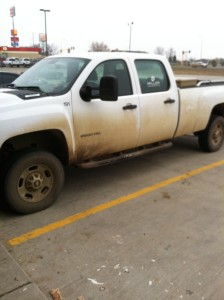
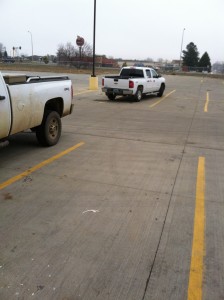
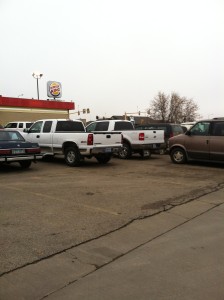
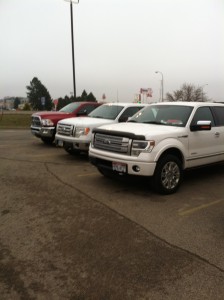
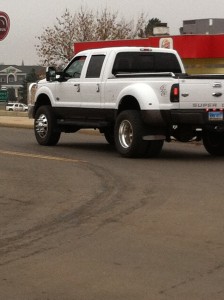
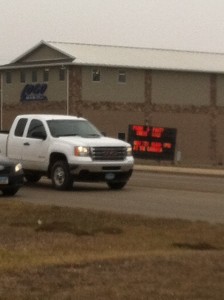
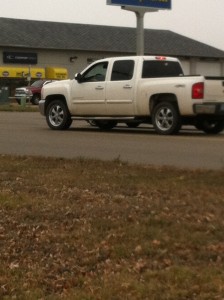
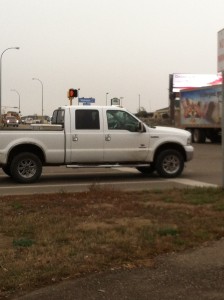
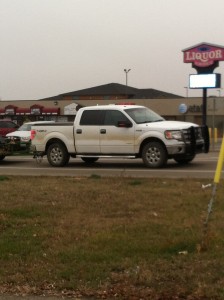
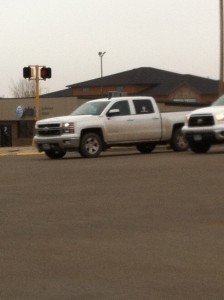
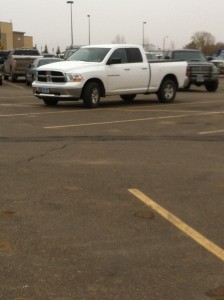
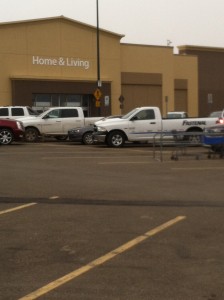
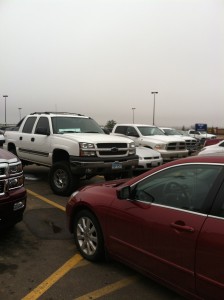
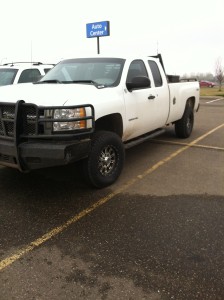
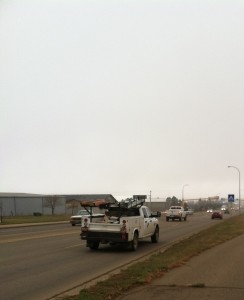
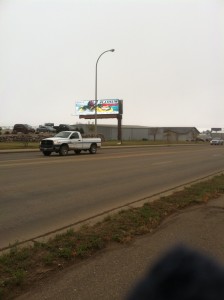
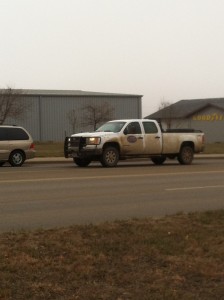
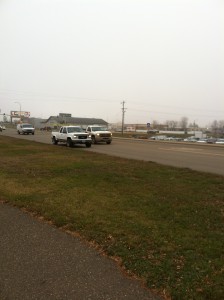
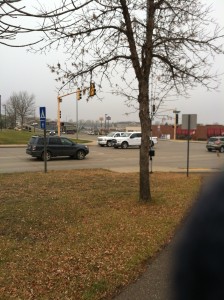
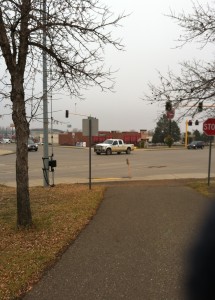
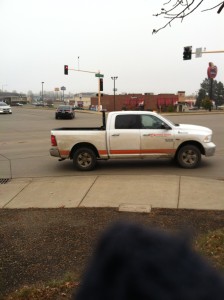
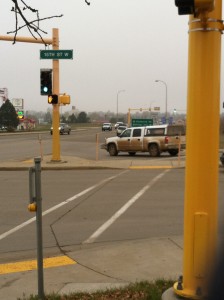
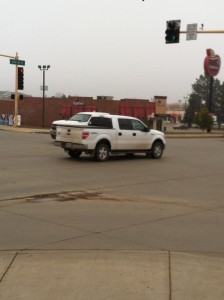
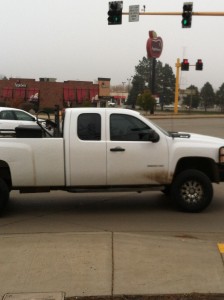
I had read an article in The New York Times by John Eligonjan called An Oil Town Where Men Are Many, and Women Are Hounded. The story, specifically about Williston, pointed to the disproportion between men and women in western North Dakota since the oil boom. Most of the immigrants who came to work on the oil rigs were men. This set up an environment where local girls were a rare commodity and single, not to say horny, men were a dime a dozen. According to the article:
“Many (women) said they felt unsafe. Several said they could not even shop at the local Walmart without men following them through the store. Girls’ night out usually becomes an exercise in fending off obnoxious, overzealous suitors who often flaunt their newfound wealth…Prosecutors and the police note an increase in crimes against women, including domestic and sexual assaults…Some women have banked on the female shortage. Williston’s two strip clubs attract dancers from around the country. Prostitutes from out of state troll the bars.
Natasha, 31, an escort and stripper from Las Vegas, is currently on her second stint here after hearing how much money strippers made in Williston on a CNN report last year. Business in her industry is much better here than in the rest of the country, she said. She makes at least $500 a night, but more often she exceeds $1,000. “We make a lot of money because there’s a lot of lonely guys.”
Because of the article and other news reports I had heard about this oil boom I was prepared to judge the lonely guys in their white pickup trucks harshly. I expected cowering women and leering men at the Wal-Mart. I didn’t see any. The people there and at the hotel and at the Loaf n’ Jug seemed just like people I knew back home. No one acted odd or was ill at ease. On my walk back to the hotel I thought about the generalizations I had made about Dickinson and North Dakota and the people who lived there. I thought about the jokes I had told and the stereotypes I had accepted. And I found myself coming back to the same sad realization I had made about my experiences in Oklahoma (see my essay, Michael). It is easy to travel but it is hard to “know” a place. At best we get glimpses, glimpses of people and places. From the road we see the farms and fields that are along the road. At the hotel or the store we meet and talk to the people who are at the hotel or the store. We do not get to sit down to dinner with folks in town. We do not get to open the gates and drive out into the prairie. We only ever scratch the surface.
My experience of Dickinson, North Dakota consisted of a handful of very friendly people at the Dickinson Astoria Hotel and the local Dickinson Wal-Mart, two days of dreary, low-overcast weather, and a glimpse of an austere brown wintertime prairie seen from the road. It almost seems silly for me to write to you about it. Considering the scale of things I know just about as much about Dickinson as those of you who have never been there.
On our last day in Dickinson the hotel van driver took us over to a local Mexican restaurant so we could get some lunch. My Flight Attendant had lost her credit card and wanted to cash a check. The driver, another oil-boom optimist from Chicago, offered to take her to a local bank. The bank would not accept her out-of-town check. Chivalrously, he drove us to “his” bank where he had an account and when they would not accept her check either he allowed her to write him a check which he then cashed and gave her the money. He drove us over to the restaurant, suggested some good menu items, and refused a tip when I got out of the van. Good people are to be found wherever I go.
What are we to think? How are we to feel? Is Mark Twain right? I think so. I believe that coming to Dickinson opened my mind just a little bit. It wiped away some stereotypes and made me sympathize with the struggles of other people, people who came thousands of miles to a cold and unforgiving place to try to make a living and people who were born and raised here only to see their little town taken over by outsiders.
Late in his life Mark Twain said,
“Travel has no longer any charm for me. I have seen all the foreign countries I want to except heaven & hell & I have only a vague curiosity about one of those.”
Though I am sometimes discouraged about what I can hope to “know” I still think it is worth trying to “see” and unlike my hero, Twain, travel still charms me. I hope it continues to do so.
by Dustin Joy
